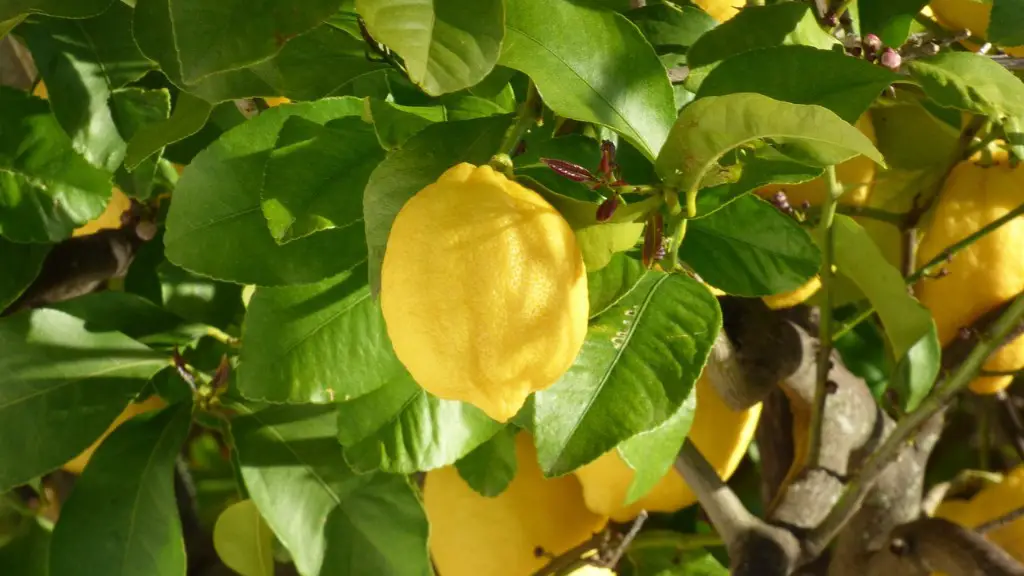Impact of Weather Conditions
Studies have suggested that the weather conditions in a given area may be responsible for why cherries are falling off of their trees prematurely. Specifically, if the climate is unusually hot and humid, it can cause the fruits to dehydrate and fall off the stems. This adversely affects the quality of the produce and the yield of the crop. Additionally, if the region experiences a late frost, the tender fruit can absorb too much water, which in turn causes the tree to drop off the fruit.
Furthermore, it has been proven that high wind speeds can cause damage to tree branches, leading to premature fruit shedding. Additionally, if the tree is stressed due to lack of water or excess of it or if there is an infestation of pests, then this too can cause the tree’s cherries to drop off.
Not All Frost & Heat are Equal
When a cherry tree is exposed to extreme cold or heat and lacks sufficient water, it could quickly start to shed its fruit. Frost is the most common cause of cherries falling off their tree, however, temperature extremes can also be responsible. The issue is further compounded if the freeze is accompanied by high wind speed or the heat wave is accompanied by high humidity.
Studies have also shown that a cherry tree’s roots need to be given proper sustenance so as to enable them to reach out and draw enough moisture from the soil. If a tree’s root system is stressed due to drought or flood, then this could prevent the tree from adequately absorbing and/or storing enough moisture for the cherries, resulting in their dropping off the stem prematurely.
High Yield Management
When a cherry tree’s stems bear a high burden of fruit, the tree can become overburdened and cause the cherries to fall off the stem prematurely. This will prove to be a great loss to the farmer, who will suffer significantly reduced yield and consequently, reduced profits. To reduce the load on the tree, selective harvesting must be employed to ensure that the cherries do not hasten their ripening and fall off the stem prematurely.
Additionally, when a cherry tree is pruned excessively, it can also disrupt the amount of water and nutrients reaching the stem and the handling of this delicate load can impinge further damage to the stem, leading to drop off of the cherries.
Effects on Quality
In most cases, the cherries that drop off of the tree prematurely tend to be of inferior quality as compared to mature cherries. To ensure high-quality cherries are harvested, it is important for a farmer to select the ripest cherries and harvest them at the peak of their freshness. Additionally, the cherries must also be harvested in a timely fashion as waiting too long can cause them to rot, fall off the stem or be attacked by pests and pathogens.
Inappropriate Fertilization
Fertilizers are important for maintaining a healthy cherry tree and supplying it with the necessary nutrients for a successful harvest. However, when it comes to cherries, it is essential to use fertilizers sparingly and carefully. Over fertilization can cause the tree to produce an excessive amount of fruit, leading to limbs and branches breaking off and causing premature dropping of cherries. Additionally, over-fertilization can also lead to the cherries being larger than desired and hence, not suitable for commercial sales.
Lack of Pest Control
Pest infestation is one of the leading causes of cherry trees shedding fruits prematurely. If the tree is infested with pests such insects and larvae, they can cause severe and irreparable damage to the structure and fruits of the tree. The best way to prevent this from happening is to employ a pest control program to ensure that the tree is monitored regularly and cared for properly.
Insufficient Nutrient Management
Cherries require an optimal balance of nutrients in order to thrive and produce the best quality fruits. If the soil does not have an appropriate balance of nutrients, then the tree can become nutrient-deficient and cause the fruit to drop off prematurely. Keeping an eye on the soil conditions and providing the necessary supplements to the tree is necessary for a successful harvest.
Incorrect Watering
Proper and timely watering is essential to prevent a cherry tree from dropping its fruits. By understanding the tree’s seasonal water needs and ensuring that the tree gets sufficient moisture throughout the year, farmers can considerably reduce the chances of premature fruit-drop. Additionally, less water can be given during times of heavy rainfall and more needs to be provided during dry spells, to prevent the tree from going into stress mode and shedding its fruit prematurely.
Adequate Pollination
Cherry trees need to be adequately pollinated in order to bear fruit. As per experts, a cherry tree cropping success is dependent on its pollination. Most commonly, honeybees are used for this purpose. If the tree does not get enough bees to collect pollen from it, then its fruit crop will suffer and could potentially fall off prematurely. By providing the tree with the necessary pollinators and enabling the process of pollination, farmers can ensure that their cherry trees are provided with enough resources to produce a successful harvest.
Better Pruning Practices
Another important factor for avoiding premature cherry dropping is adopting proper pruning practices. Pruning is essential to remove old and diseased limbs, open up the tree canopy and support more vigorous growth. Additionally, proper pruning techniques also support air circulation, which is necessary for preventing certain diseases. Pruning too early or too late in the season, or removing more than the necessary amount of branches, can cause the tree to become top-heavy and lead to a significant drop in the fruit yield.
